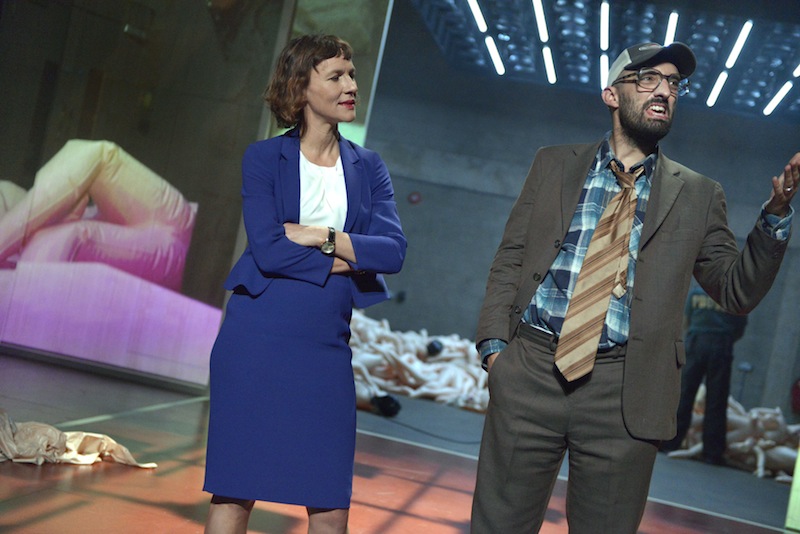If one definition of Shakespeare’s problem plays is that they can’t easily be categorised in the canon, being neither tragedy nor comedy, then that issue is swept aside by this radical Young Vic production. In the hands of director Joe Hill-Gibbins, Measure for Measure is incontrovertibly a comedy, careering between satire and feverish farce.
After the Globe’s, this is the second rowdy presentation of the play this year; there’s clearly something in the air. But Hill-Gibbins’ modern-dress version doesn’t entirely eschew meaning for frivolity. The famous inconsistencies in the characters’ behaviour are conveyed here, quite simply, as weakness and hypocrisy, a malaise in both church and state that tinges our laughter with unease.
The intended tone of the evening is made astonishingly apparent in an opening tableau; where the actors of Aristophanes’ comedies often wore giant phalluses around their waists, the whole ensemble of Measure for Measure start the play by writhing on the ground amid a seething mass of inflatable sex dolls, trip-hop music and projected animations adding to the feeling of surreal, sex-den iniquity. I doubt there will be a more striking opening on stage this year.
The ensemble begin by writhing on the ground amid a seething mass of inflatable sex dolls
And as Zubin Varla’s Duke emerges from this comically plastic orgy, unable to look his minions in the face, hands twitching, his voice straining to leave his body, one can’t help feeling that the licentiousness of this Vienna is laced with narcotics, and that the Duke himself – as well as allowing his governance to get a little slack – has partaken of the debauchery. His assertion that “I love the people” is greeted with one of the loudest laughs of the night, so anxiously and insincerely is it delivered, as though he and the people know each other too well; no wonder he’d rather Angelo be the one to return the city to a degree of decorum.
And no wonder that the devout Isabella (Romola Garai) has taken herself to a nunnery. The novice nun is sucked back into the city when she learns that her brother Claudio faces execution, the whipping boy for Angelo’s crackdown against vice. More than ever, we sense that she’s not going to be the ideal champion.
Awaiting her is Paul Ready’s Angelo, not the creepy and sinister autocrat so often portrayed, but a strait-laced bureaucrat, primly attired in close-fitting waistcoat and holding his Bible as if it’s a personal organiser. He’s Isabella’s “pelting petty officer” to a tee, grabbing his moment in the hot seat and as surprised as anyone when stirred by her virtue – quite ridiculously – to add his own venality to the pot. Some may feel Ready a little bland, but his commonplace fallibility fits the production; and if Garai gets shrill at times, the spectacular deterioration of her Isabella from pious petitioner to wronged woman to errant sister finally prepared to see her brother die – and wanting to get it over with – hilariously feeds the notion that the whole of this society is lost in a moral maze.
 That’s perhaps why the strongest impressions here are made by the Duke, whose manipulations appear to be the riffing of a man who seems profoundly psychotic, and Tom Edden’s brashly American pimp, Pompey (pictured right, with Sarah Malin's female Escalus), who knows exactly who is he, and whose leering confidence suggests that this Vienna is not for saving.
That’s perhaps why the strongest impressions here are made by the Duke, whose manipulations appear to be the riffing of a man who seems profoundly psychotic, and Tom Edden’s brashly American pimp, Pompey (pictured right, with Sarah Malin's female Escalus), who knows exactly who is he, and whose leering confidence suggests that this Vienna is not for saving.
Indeed, the dolls remain at the front of the stage for some time, the actors constantly ploughing through them, or throwing them out of their path, suggesting that the red light district has swallowed the city whole; later, they are piled high in the prison to the rear, but never out of sight.
With the introduction of the prison, designer Miriam Buether’s set operates on two planes – at the forefront an open box in which the main players confront each other, to the rear the prison; often a partition separates the two, the action behind it conveyed to the audience through a live video feed projected onto the wall; actors occasionally dive through a door between the two areas, each movement accompanied by a prison klaxon, the frantic noise and movement adding to the increasingly farcical energy of proceedings.
 Surveying his exercise in power-sharing while disguised as a monk, the Duke (Varla pictured above, with Ivanno Jeremiah's Claudio) also uses the video camera as he hears confession, giving that religious exchange the air of a state interrogation, blurring the lines between secular and devout, and making us question whether his interventions are sincere or just fuel for a self-indulgent game.
Surveying his exercise in power-sharing while disguised as a monk, the Duke (Varla pictured above, with Ivanno Jeremiah's Claudio) also uses the video camera as he hears confession, giving that religious exchange the air of a state interrogation, blurring the lines between secular and devout, and making us question whether his interventions are sincere or just fuel for a self-indulgent game.
Hill-Gibbins’ daring construct includes a couple of musical surprises – Angelo’s jilted lover Mariana (Cath Whitefield) belting out Alanis Morissette’s "You Oughta Know", and hip hop playing amongst the mugging inmates of the prison. Technically, the whole thing works a dream; conceptually, he just about gets away with it. The result is that Shakespeare’s muddying of the moral waters is played with clear-eyed gusto, in which the usually confused ending – the romantic trappings far from happy – is lent the nudge-wink knowingness of satire.
- Measure for Measure at the Young Vic until 14 November















Add comment